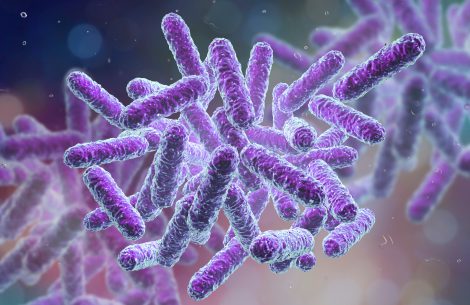The potential health benefits of understanding the human microbiome surpasses what many believed the understanding of human genes would do to advance the treatment of diseases and improve health. Genomic medicine is a tough shell to crack because genes can’t be changed whereas our microbiome can and does change throughout life. And research shows the ability to change it may also improve health and heal diseases.
Microbiome exists on our skin, in our mouth, our gut, and elsewhere. And there are a lot of them; it’s estimated that there are ten times more microbial cells than human cells. Researchers believe there are more than 8 million unique microbiome genes associated with the healthy human.
Nobel laureate, Joshua Lederberg, coined microbiome in 2001 to describe the “collective genome of our indigenous microbes (microflora).”[1] There is some confusion between the terms “microbiota,” “microflora” and “microbiome.” Microbiota and microflora refer to microbial organisms, such as gut bacteria. A microbiome is a group of the microbes and their genes.
There are unique microbiomes for the different parts of the body, and microbiomes differ from person to person. Also, microbiota can be different from one individual to another depending on where they live. One study showed that a marine gene was found in the gut flora of Japanese individuals, but was not present in subjects from the United States. The authors of the study surmised that the marine gene in the Japanese population was because the Japanese regularly eat seaweed whereas Americans don’t typically eat seaweed.
How Microbiomes Help the Body
Microbiota is necessary for digestion, to break down drugs, detoxify carcinogens, assist the immune system, and support other bodily processes. Research is showing that microbiota may play a role in diseases and health conditions, both in acquiring and healing them. Below are the findings of some of the research connecting microbiome with health.
Obesity and Weight
Animal research showed gut microbiota might play a role in obesity. After microbes from an obese person were inserted into germ-free mice, the mice became fat. Also, microbes transferred from slim people into another group of mice prevented the mice from becoming overweight. Studies showed different amounts of certain bacteria in the genetically altered obese mice when compared to genetically altered lean mice.
Analysis of the research showed that two groups of microbes, Firmicutes and Bacteriodetes were found in different quantities in the obese mice. Firmicutes were more abundant in the obese mice, and Bacteriodetes were less abundant in the obese mice.
Additional studies on human subjects with one group on a fat-restricted diet and other on a carbohydrate-restricted diet found that Bacteriodetes increased as body weight decreased. It suggests that changing a person’s microbiota may help with weight loss and obesity. Reversely, it may also help children who are underweight to gain weight.
Malnutrition
Microflora research done on diseases associated with malnutrition in children was also affected by the introduction of microflora into mice. Microflora from children in Malawi with a devastating nutritional deficiency was transferred to mice. These mice lost 30 percent of their body weight in three weeks.
This research and other types of research have led to a microbiome-sequencing project that studies the microflora of people worldwide. The study is collecting microbiome of non-Western people to see how they differ and to discover what are the common microbiomes that keep entire populations healthy. The intention is to possibly reintroduce ancestral microbes into humans who no longer have them to improve health.
Intestinal Diseases
Studies show that there may be a connection between low microbial diversity and inflammatory bowel disease and Crohn’s disease.
Autism
Another study showed how wide-reaching changing the microbiome could be. Microbiome augmentation was used in a small study to see if it helped children with Autism. A parent of a child in the study described her son from going to being mostly non-verbal to being a chatterbox. The results were so promising that Baylor College of Medicine with funding from Autism Speaks is doing a study with a larger population of participants.
Changing Your Microbiome
Evidence suggests that healthy people have a diverse microbiome in their gut. So, what can you do to improve your body’s microbiome?
Changing the diet is the best way to alter your microbiome. It’s the same approach for a healthy diet: Replace processed food with fresh vegetables and fruit. Eat a variety of whole foods and less saturated fats.
Christine Northrup, M.D. a well-known women’s health specialist also recommends removing sugar and other refined carbohydrates. Regularly consume fermented foods high in prebiotics, such as kimchi, sauerkraut, yogurt with live cultures, kombucha, and kefir.
She also recommends not using antacids because they interfere with the body’s ability to digest properly. Instead, she suggests taking a digestive enzyme supplement.
The body’s microbiome plays a considerable role in a person’s health. While the research on microbiome and diseases is relatively young, it’s showing a lot of promise. As co-founder of the American Gut Project, Rob Knight, says, “We have the potential not just to read out our microbiome and look at predispositions but to change it for the better.”[ii]
This information is for education purposes only. It’s not intended to diagnose or treat any illnesses or diseases.
References:
- Elsen, Jonathan. What does the term microbiome mean? And where did it come from… April 8, 2015. Web. Retrieved from https://www.microbe.net/2015/04/08/what-does-the-term-microbiome-mean-and-where-did-it-come-from-a-bit-of-a-surprise/.
- Dill, Tiffany. Can You Change Your Microbiome? (May 02, 2018). Retrieved from http://www.pbs.org/wgbh/nova/next/body/changing-your-microbiome/.
- Knighton, Rob. Microbiome Research May Soon Pay Off Big (March 1, 2015). Retrieved from https://www.scientificamerican.com/article/microbiome-research-may-soon-pay-off-big/.
- Northrup, Christine, M.D. How To Improve Your gut Microbiome in A Day. Retrieved from https://www.drnorthrup.com/how-to-improve-your-gut-microbiome-in-a-day/.
- Picton, Glenna. New clinical study to focus on gut, autism connection (Febuary 5, 2015). Retrieved from https://www.bcm.edu/news/pathology-and-immunology/clinical-study-focus-on-gut-autism-connection.
- Ursell, Luke, et al. Defining the Human Microbiome. Retrieved from https://www.ncbi.nlm.nih.gov/pmc/articles/PMC3426293/.
- Yang, Joy. the Human Microbiome Project: Extending the definition of what constitutes a human (July 16, 2012) Retrieved from https://www.genome.gov/27549400/the-human-microbiome-project-extending-the-definition-of-what-constitutes-a-human/.

